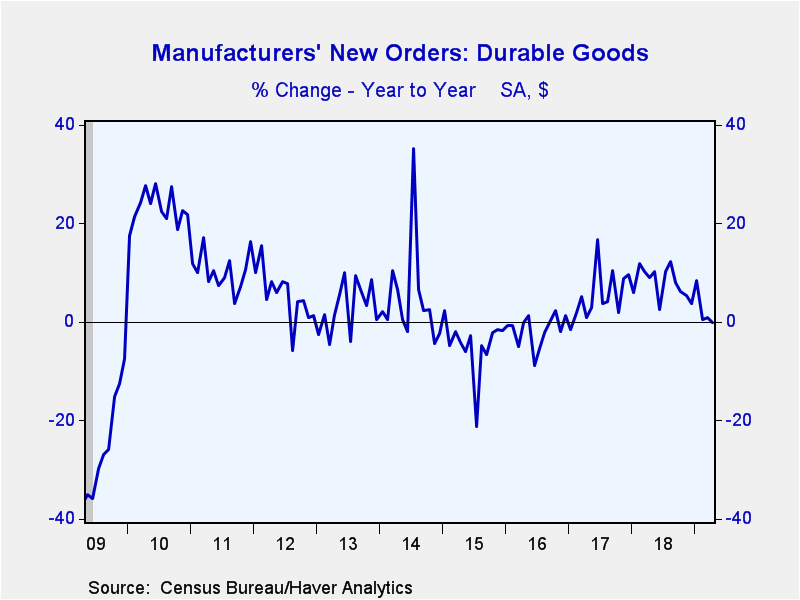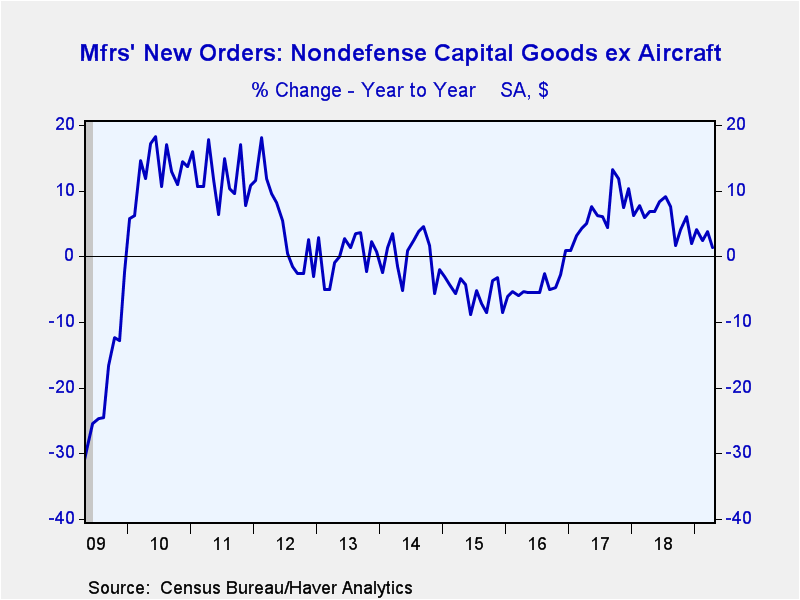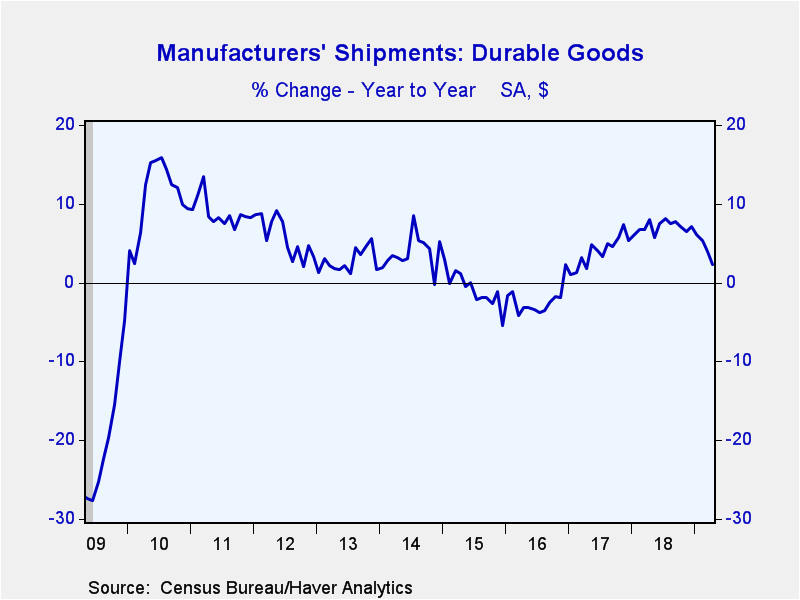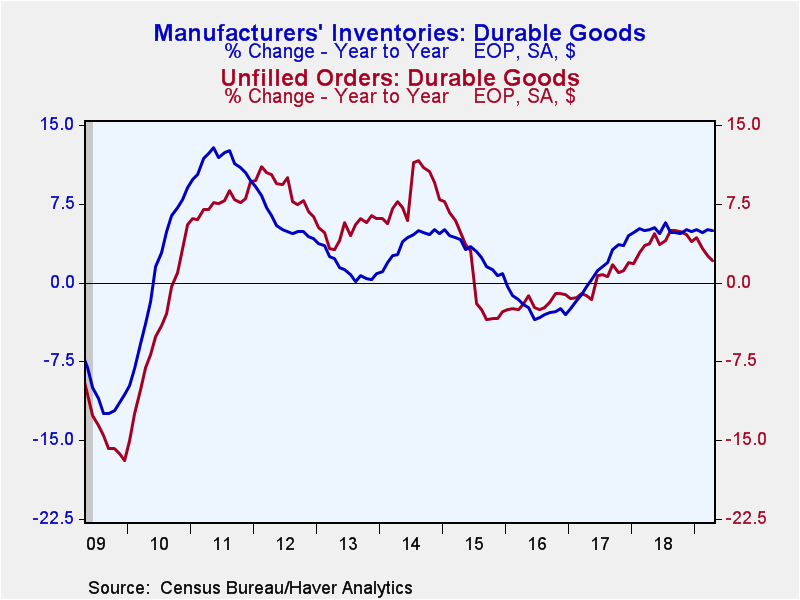 Global| May 24 2019
Global| May 24 2019U.S. Durable Goods Orders Decline Broadly
by:Tom Moeller
|in:Economy in Brief
Summary
Factory sector activity continued to weaken last month. New orders for durable goods fell 2.1% during April and were unchanged y/y. A 1.7% rise in orders during March was revised from a 2.7% gain reported initially. Expectations in [...]
Factory sector activity continued to weaken last month. New orders for durable goods fell 2.1% during April and were unchanged y/y. A 1.7% rise in orders during March was revised from a 2.7% gain reported initially. Expectations in the Action Economics Forecast Survey had been for a 2.0% decline in April durable goods orders.
A 5.9% shortfall (-0.3% y/y) in transportation sector orders led total new orders lower, reversing its March rise. Nondefense aircraft & parts orders fell by one-quarter and they were down by one-third y/y. Defense aircraft orders fell 2.4% (+40.5% y/y). New orders for motor vehicles & parts declined 3.4% (+2.9% y/y) following a 0.4% gain.
Orders for nondefense capital goods weakened 5.0% (-4.3% y/y) and reversed the 2.6% rise during March. Orders excluding aircraft eased 0.9% after two straight 0.3% increases. The y/y increase decelerated to 1.3%, the weakest rise in just over two years. It was below the peak 13.2% y/y rate of increase in September 2017.
Elsewhere in the durable goods sector, primary metals orders declined 0.8% (-4.9% y/y), but orders for fabricated metals increased 0.4% (-1.1% y/y). Computer & electronic product bookings eased 0.4% (+4.8% y/y) due to a 5.5% decline (+7.7% y/y) in communication equipment orders. Orders for computers & related products rose 4.0% (-2.6% y/y). Orders for machinery gained 0.1% and were unchanged y/y. Electrical equipment orders rose 0.9% (2.8% y/y).
Shipments of durable goods declined 1.6% (+2.3% y/y) following a 0.5% fall. A 4.1% weakening (+3.6% y/y) in transportation sector shipments led the total lower. Shipments excluding transportation fell 0.2% (+1.7% y/y). Unfilled orders for durable goods eased 0.1% (+2.1% y/y) both including and excluding transportation. Inventories of durable goods increased 0.4% (5.0% y/y) led by a 1.1% gain in transportation sector inventories. Inventories excluding transportation rose 0.1% (4.7% y/y).
The durable goods figures are available in Haver's USECON database. The Action Economics consensus forecast figure is in the AS1REPNA database
| Durable Goods NAICS Classification | Apr | Mar | Feb | Apr Y/Y | 2018 | 2017 | 2016 |
|---|---|---|---|---|---|---|---|
| New Orders (SA, % chg) | -2.1 | 1.7 | -2.6 | -0.0 | 7.9 | 5.4 | -1.7 |
| Transportation | -5.9 | 5.9 | -6.7 | -0.3 | 9.8 | 3.2 | -0.6 |
| Total Excluding Transportation | 0.0 | -0.5 | -0.3 | 0.1 | 6.9 | 6.5 | -2.3 |
| Nondefense Capital Goods | -5.0 | 2.6 | -5.9 | -4.3 | 5.5 | 9.1 | -5.8 |
| Excluding Aircraft | -0.9 | 0.3 | 0.3 | 1.3 | 6.0 | 6.7 | -4.5 |
| Shipments | -1.6 | -0.5 | 0.0 | 2.3 | 7.1 | 4.0 | -2.3 |
| Unfilled Orders | -0.1 | 0.1 | -0.4 | 2.1 | 3.9 | 1.9 | -1.1 |
| Inventories | 0.4 | 0.3 | 0.4 | 5.0 | 4.8 | 4.5 | -3.0 |
Tom Moeller
AuthorMore in Author Profile »Prior to joining Haver Analytics in 2000, Mr. Moeller worked as the Economist at Chancellor Capital Management from 1985 to 1999. There, he developed comprehensive economic forecasts and interpreted economic data for equity and fixed income portfolio managers. Also at Chancellor, Mr. Moeller worked as an equity analyst and was responsible for researching and rating companies in the economically sensitive automobile and housing industries for investment in Chancellor’s equity portfolio. Prior to joining Chancellor, Mr. Moeller was an Economist at Citibank from 1979 to 1984. He also analyzed pricing behavior in the metals industry for the Council on Wage and Price Stability in Washington, D.C. In 1999, Mr. Moeller received the award for most accurate forecast from the Forecasters' Club of New York. From 1990 to 1992 he was President of the New York Association for Business Economists. Mr. Moeller earned an M.B.A. in Finance from Fordham University, where he graduated in 1987. He holds a Bachelor of Arts in Economics from George Washington University.










